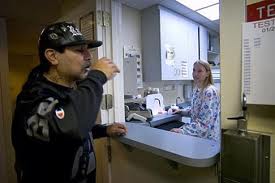Methadone is well known these days as a narcotic medicine that is used to treat opiate addiction. A narcotic itself, the drug first came on the scene in the United States back in 1947. German scientists had developed it during World War II as a synthetic pain killer.
At first, the powerful medicine was prescribed to ease post surgical pain and that of cancer patients. Three years after American physicians first put it to use, they realized its benefits for people trying to kick heroin and morphine addictions. Methadone helps counteract what can be very severe withdrawal symptoms from the other drugs.
Methadone is a synthetic medicine which is created in laboratories. Heroin and morphine are both made from opium poppies. Their pain-killing abilities last approximately two to four hours, while methadone’s effects in the body continue for 24 hours.
Opiates are highly addictive and produce intense reactions. Humans actually make their own chemicals in the body that are similar to opiates. These are called endorphins, which many people know of as positive after effects of exercise; some people become addicted to exercise because of the endorphins created in the body.
Endorphins reside in the brain and block signals of pain as well as creating euphoria or feelings of well-being. Opiates are like endorphins in where they reside in the brain; they fit into duplicate receptors. They are much more intense than endorphins, however, and users report feeling a rush of warmth and happy, relaxed feelings followed by a kind of numbness.
For someone suffering from physical or emotional pain, it is no wonder that opiates are so alluring. The first dose is usually very intense, and many people will continue using the drug to reproduce the first high. Addicts grow tolerant to the drug and must use higher dosages to reach that state of euphoria.
Addicts also learn that the succeeding highs do not last as long as the ones experienced early on. The addict ends up needing to take the drug more often. This is one of the reasons that addiction is so crippling; soon, an addict will need to find sources for greater quantities of the drug and find them more often.
When someone addicted to an opiate misses a dose or tries to quit without help, he or she will experience withdrawal symptoms. Withdrawal can be extremely harsh to the body and mind. The unpleasantness of withdrawal may include symptoms such as upset stomach and diarrhea.
Muscle and joint pain along with depression and anxiety can also accompany withdrawal. These symptoms and a host of others may start showing up within just a few hours after the addict’s last dose. Fear of withdrawal keeps many addicts from leaving their drugs behind.
Addiction is not just an emotional response of course. Physical need for the drug is real. The body has grown accustomed to it, and can no longer function in the same ways without it.
With guidance, and the aid of medicines such as methadone, the addict can leave behind the street drug and go on to a healthier life. Methadone can relieve the discomfort of withdrawal from opiates. Methadone does not provide the same high as heroin, for example, but it is working within the brain in the same way.
Methadone not only keeps opiate addicts from going into withdrawal, it also works to block the effects of other opiates. In the case of an addict who relapses while undergoing methadone treatment, he or she will not be able to feel the euphoric effects of the other drug. Methadone does not cure opiate addiction, but it can be extremely helpful.
It can keep addicts from going into withdrawal so they can stay away from dangerous street drugs such as heroin. Methadone provides the help needed so addicts can start redirecting their lives toward recovery. Methadone is addictive itself, so it needs to be taken under medical supervision.
Methadone comes in both pills and liquids. It can be administered at a drug treatment clinic or treatment center, or a physician can write a prescription so the patient can take the dose at home. Counselling is a recommended companion to medical intervention so that the addict can discover the life issues that have led to drug use.
Although methadone is a godsend for many addicts, it too has it problems. It is sometimes traded on the streets for illegal opiates so the addict can continue using the earlier drug. Another danger of methadone is the possibility of overdose especially when methadone is taken along with alcohol or other drugs.
Addicts taking methadone may be tempted to take opiates at the same time. This is extremely dangerous and can lead to seizures, coma and death. Methadone, when taken correctly, is a wonderful tool to help eradicate drug addiction.


